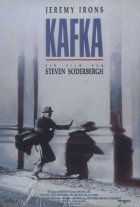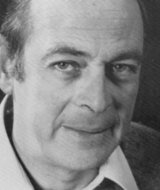
Kafka
- PG-13
- Year:
- 1991
- 98 min
- 709 Views
PRAGUE - MORNING
The Old Town is quiet. It's very early in the twisted
streets of this ancient ghetto. Dark corners casting a
medieval spell over a modern century oblivious to their
romance and mystery.
The River is the dividing line. Elegant gardens on the
opposite bank embracing the monotonous solemnity of the New
Town, tower steeples silhouetted against the sombre sky.
An empty motor bus rattles along a deserted street.
A Gothic bridge links the two halves of the strange city.
Its half-moon arches becoming circles as they meet their
reflections in the water. Thin mist swirls over the
cobblestones above.
A few boats in the water. Fishermen casting their lines in
silence. One or two lights now burning in buildings beyond.
In the Old Town Square the great clock on the cathedral
strikes six.
CUT:
A MAN'S FACE
His eyes filled with terror, beads of sweat crawling on his
brow.
He stands in the middle of a murky courtyard, perfectly
still. Waiting. Watching.
The balconies overlooking on successive floors, looming all
around him, are empty. All is quiet.
The man's name is EDUARD. He dares not move for fear of
missing a single sound. And then he hears it. A small noise
of movement nearby. He runs.
TINY ALLEYWAY:
He runs alone in the dim light of the deserted morning.
CROOKED PASSAGEWAY
Running for his life.
NARROW LANE:
Running on sheer pumping fear, long after the verge of
collapse.
BLACK TUNNEL:
Coming out into the light, but by no means out of danger, he
allows himself a brief pause, gasping for air, just for a
moment looking back into the gloom, starting to retreat again
even as he does, then turning running ...
WINDING STREET:
He runs on, past boarded-up houses and shuttered inns,
strange relics of the Middle Ages casting frightening
shadows.
AROUND A CORNER:
Eduard appears suddenly, quickly flattens himself back
against the large notice board that covers the wall here,
layers of expressionistic theatre and film posters pasted on
it.
He breathes painfully in short bursts, as silently as he
can. He watches the corner he's just come from, the ornate
archway through which any pursuer must emerge.
Nothing there. But then a shadow moves.
Eduard's shoulders tense. His eyes widen. He holds his
breath.
The shadow ... spreading ...
Eduard edges away ever so slowly, keeping his unblinking gaze
on the archway, backing off, one arm brushing the notice
board as he feels his way along it, macabre images on the
posters, some torn and incomplete, revealing other fragments
behind, Eduard's eyes staring constant, no noise here at all
and --
A HAND! clamps over his face from behind. All of a sudden
and out of absolutely nowhere and not a thing he can do about
it.
But he tries, his hands coming up to grip the arm that grasps
him, an arm of iron.
The hand is huge. It covers Eduard's face almost entirely,
only one eye gaping bloodshot through the fingers, ghastly
fingers that, just for a second, seem almost inhuman, perhaps
even fingers that seem incompatible on the same hand, a hand
covered in scar tissue, starting to squeeze as it pulls
Eduard swiftly away.
CUT:
A ROW OF TYPEWRITERS - DAY
Clacketing incessantly under slightly more agile and refined
fingers. Beyond these, another row of desks. And beyond
that another, the office workers in their neat suits tapping
away.
And beyond that another, at which one worker scribbles
furiously at his figures, the next rolls a new sheet into his
typewriter, the next answers his clanging telephone, the next
rifles through the pages of a massive record book, the next
sits erect in his chair playing his machine like a piano, and
the last, by the window, dusty light streaming across him,
contemplatively taps the end of a pencil onto his desk. This
is KAFKA.
A rather tall young man with a kind, sensitive face.
sensitive perhaps because his eyes, ears, and nose seem
slightly bigger and more inquiring than most, and his gaze
one of almost unrelenting intensity.
He's looking off at something now.
A desk, not very far from his own. But empty. The chair
pushed squarely under it. The typewriter covered.
Kafka is wondering why -- when his concentration is
interrupted.
BURGEL:
Kafka.
Kafka turns to see BURGEL, a creep.
BURGEL:
The keeper of the files is still
waiting for your final summation
of the Erlanger claim.
KAFKA:
I gave it to him yesterday.
BURGEL:
(doesn't understand)
You didn't give it to me.
KAFKA:
No, I left it in his office.
BURGEL:
Did you see him?
KAFKA:
I've never seen him. I don't
believe there is a keeper of the
files.
BURGEL:
He's usually in the storage room
sorting things out. He can't
close the file on a case until he
has the concluding report.
KAFKA:
He has it, he just hasn't noticed
it yet, all right?
BURGEL:
Who's to say he ever will? He's
a timid old man and quite careful
not to tread on anyone's toes --
In fact, I'm the only one he trusts
and he wouldn't even look at a
document if it didn't first come
through me.
Burgel just won't go away. Kafka tries to get on with his
work.
BURGEL:
In an organization as efficient as
ours, if a document once in a great
while gets lost it might never be
found at all.
KAFKA:
(tiring of this)
easier, as long as I was passing --
BURGEL:
But I'm the messenger. An error
like this damages my credibility.
KAFKA:
Your credibility -- yes, it's well
known.
BURGEL:
(flushed)
When I deliver a message the very
act of delivering it, you might say,
gives it an official stamp, and only
in this way are both the sender and
the receiver satisfied that it was
delivered at all.
KAFKA:
I'll commit that to memory.
They stare at each other with mutual antagonism.
BURGEL:
Your position in this firm is not
unassailable.
He waddles away.
KAFKA:
Has one more look over at the empty desk before returning to
his work.
THE OFFICE:
The desks make a checkerboard pattern of the huge floor as
Burgel calculates his path among them.
CUT:
LODGING HOUSE - MIDDAY
Kafka comes up the stairs to the top landing. He knocks on a
door. Waits. Knocks again. Leans a little closer to listen
for a moment, then goes away back down the stairs.
GROUND FLOOR:
Kafka comes through the door that divides the stairs from the
hall, goes to knock on the door of the first apartment down
here.
BIZARRE VOICE:
Yes?
KAFKA:
wonder if you know where my
friend Eduard is?
BIZARRE VOICE:
I can't hear you! -- You'd better
come in.
APARTMENT:
Kafka comes in tentatively, seeing the CONCIERGE in a far
corner of the cluttered room, in bed, covers tucked right up
to her chin.
KAFKA:
-- I didn't want to bother you.
CONCIERGE:
Well, you have. What do you
want?
KAFKA:
(pointing upstairs)
My friend Eduard, I wonder if you've
seen him? He hasn't been in to
work, I thought he might be ill.
CUT:
STAIRS:
The Concierge trudges up to the top floor, Kafka following
guiltily.
KAFKA:
You didn't have to get out of
bed -- I could have taken the key.
Translation
Translate and read this script in other languages:
Select another language:
- - Select -
- 简体中文 (Chinese - Simplified)
- 繁體中文 (Chinese - Traditional)
- Español (Spanish)
- Esperanto (Esperanto)
- 日本語 (Japanese)
- Português (Portuguese)
- Deutsch (German)
- العربية (Arabic)
- Français (French)
- Русский (Russian)
- ಕನ್ನಡ (Kannada)
- 한국어 (Korean)
- עברית (Hebrew)
- Gaeilge (Irish)
- Українська (Ukrainian)
- اردو (Urdu)
- Magyar (Hungarian)
- मानक हिन्दी (Hindi)
- Indonesia (Indonesian)
- Italiano (Italian)
- தமிழ் (Tamil)
- Türkçe (Turkish)
- తెలుగు (Telugu)
- ภาษาไทย (Thai)
- Tiếng Việt (Vietnamese)
- Čeština (Czech)
- Polski (Polish)
- Bahasa Indonesia (Indonesian)
- Românește (Romanian)
- Nederlands (Dutch)
- Ελληνικά (Greek)
- Latinum (Latin)
- Svenska (Swedish)
- Dansk (Danish)
- Suomi (Finnish)
- فارسی (Persian)
- ייִדיש (Yiddish)
- հայերեն (Armenian)
- Norsk (Norwegian)
- English (English)
Citation
Use the citation below to add this screenplay to your bibliography:
Style:MLAChicagoAPA
"Kafka" Scripts.com. STANDS4 LLC, 2025. Web. 1 Mar. 2025. <https://www.scripts.com/script/kafka_883>.







Discuss this script with the community:
Report Comment
We're doing our best to make sure our content is useful, accurate and safe.
If by any chance you spot an inappropriate comment while navigating through our website please use this form to let us know, and we'll take care of it shortly.
Attachment
You need to be logged in to favorite.
Log In